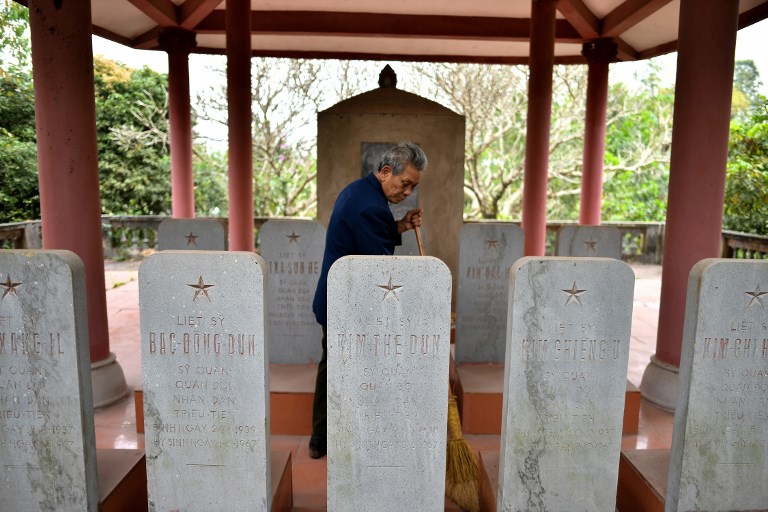English-Français
អន្តរជាតិ

Vietnamese veteran Duong Van Dau cleaning the tombstones of North Korean pilots killed in aerial battles by US pilots during the Vietnam War at a war memorial in Bac Giang province
×![]()
ដោយ: AFP
Bac Giang, Vietnam | A caretaker tends to the headstones of 14 North Koreans killed fighting in the Vietnam War, carefully sweeping around the plaques honouring Pyongyang's little-known contribution to Hanoi's anti-American crusade.
The bodies of the 12 fighter pilots and two technicians were buried here before they were repatriated in 2002 but the rarely-visited graveyard, bordered by rice paddy fields, remains a symbol of an era when Hanoi relied on Pyongyang for help.
Today Vietnam is one of Asia's fastest growing economies and counts the US and South Korea among its closest allies -- two countries technically still at war with North Korea.
Hanoi also maintains ties with Pyongyang and will next week host the second summit between US President Donald Trump and North Korean leader Kim Jong Un.
There is no word on whether Kim plans to visit the small, tidy memorial that caretaker and former soldier Duong Van Dau has looked after since 2000.
"They are martyrs who died for our country, so I have the responsibility to protect them," Dau told AFP, standing before the headstones in northern Bac Giang province.
He sometimes visits the site to light incense or clean the headstones, all of which face northeast toward the fighters' homeland.
- 'Vengeance!' -
Pyongyang sent about 80 fighter pilots to support North Vietnam during the war between 1966 and 1969, when American bombers were pounding the north as part of the Rolling Thunder campaign.
The North Koreans never came face-to-face with any of the estimated 300,000 South Koreans -- including several dozen taekwondo specialists -- fighting alongside the Americans in the south.
But they dispatched psychological warfare personnel and propaganda experts, some of whom targeted South Koreans with anti-American leaflets.
"South Korean soldiers in Vietnam! Seek hundred, thousand vengeances against the American imperialist aggressors!" read one.
Though the North Koreans are believed to have shot down several American planes, their overall contribution to the conflict was marginal and they gained a reputation for being tough but not especially effective.
"They fought very bravely in the aerial battles, (but) they were generally too slow and too mechanical in their reactions when engaged which is why so many of them were shot down by the Americans," said Vietnamese pilot Vu Ngoc Dinh, cited in Istvan Toperczer's book "MiG-21 Aces of the Vietnam War".
Though Vietnam today quietly honours Pyongyang's wartime contribution, leader Kim Il Sung's reasons for joining the fight in the aftermath of the Korean war were not totally selfless.
"By sending North Korean pilots and other elements to Vietnam, he was helping Vietnam stay in the fight and to keep the American forces tied down," Jiyul Kim, assistant history professor at Oberlin College, told AFP.
- Crumbling ties -
As the war started winding down, relations began to sour.
Pyongyang initially resented North Vietnam's willingness to negotiate with the US, and the allies continued to grow apart as Vietnam gradually embraced the West.
Relations hit a low in 1992 after Hanoi established diplomatic ties with Seoul, followed by a quarrel in 1996 over an unpaid rice shipment from Hanoi to North Korea at the height of its famine.
It took decades for either side to public acknowledge North Korea's wartime contribution.
For Vietnam, ignoring this little-known chapter offered a more courageous narrative.
"It's much more glorious to have beaten the Americans alone," Balazs Szalontai, an expert on North Korean studies and Cold War history, told AFP.
It was only around 2000 that news of North Korea's help in the war emerged and later that year a senior North Korean official visited the memorial during a trip to Vietnam.
The bodies were brought back two years later and remain in a war cemetery in North Korea along with others who fought in the Vietnam War.
In the years since diplomatic ties have gradually grown closer -- though trade trickled under UN sanctions -- a once-isolated Vietnam now stands as a potential economic model for Pyongyang.
Some Vietnam veterans hope the memorial will keep the memory of North Korea wartime involvement alive.
"When we are gone, the young ones won't know anything about what the North Koreans did for us," said 90-year-old Tran Van Nguyen, who lives near the site.
tmh-jv/dhc/joe/gle/ecl
© Agence France-Presse
© រក្សាសិទ្ធិដោយ thmeythmey.com
«ប្រេសិត»មានន័យដូចម្តេច?
4 ថ្ងៃ






















